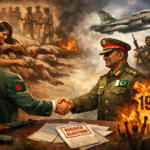In a display of regional diplomacy, Pakistan recently played host to the Shanghai Cooperation Organisation (SCO) summit, an event that attracted considerable attention across South and Central Asia. The gathering aimed to bolster cooperation between member states in areas such as security, economic development, and cultural exchanges. However, it was the speech delivered by India’s External Affairs Minister that caused ripples, highlighting key tensions within the region and raising pressing questions about the future of the SCO’s vision for regional unity.
A Brief Overview of the SCO
The Shanghai Cooperation Organisation, founded in 2001, is a Eurasian political, economic, and security alliance that originally consisted of China, Russia, Kazakhstan, Kyrgyzstan, Tajikistan, and Uzbekistan. Over the years, the organisation has expanded to include India and Pakistan, bringing together a vast portion of the world’s population and economy under its umbrella. Its primary focus has been on fostering collaboration in combating terrorism, extremism, and separatism, as well as facilitating trade and connectivity among member states.
The SCO summit in Pakistan was highly anticipated, especially against the backdrop of ongoing geopolitical tensions in the region. Both Pakistan and India, despite being member states, have had a strained relationship, and their differences often cast a shadow over regional cooperation efforts. With the addition of Afghanistan’s unstable situation and economic challenges plaguing several members, the summit was viewed as an opportunity to tackle these pressing issues.
India’s External Affairs Minister Addresses Core Regional Issues
While the summit aimed to foster unity and collaboration, Indian Foreign Minister Dr. S. Jaishankar’s address stood out for its pointed remarks, which rattled the core issues facing the region. His speech touched on several contentious topics, ranging from regional security to terrorism and economic connectivity.
Dr Jaishankar emphasized the importance of regional stability, particularly in Afghanistan, and called for stronger collective action to prevent the rise of extremist forces. The situation in Afghanistan has been a major concern for SCO members, given its potential to destabilise the region. However, the Indian Foreign Minister did not shy away from addressing what he termed as the “inconsistent policies” of some member states towards terrorism— a veiled reference to Pakistan, given the historical tensions between the two nations over cross-border militancy.
A Delicate Balance: Terrorism and Security Cooperation
One of the core pillars of the SCO is security cooperation, particularly in combatting terrorism, extremism, and separatism. Dr. Jaishankar’s speech reiterated India’s longstanding concerns about terrorism in the region, highlighting that peace and stability in South Asia could not be achieved without decisive action against militant groups.
This assertion, while aligned with the broader SCO agenda, was likely perceived as a direct challenge to Pakistan’s role in the region. Over the years, Islamabad has repeatedly refuted allegations of harbouring or supporting militant groups, asserting that it too is a victim of terrorism and has taken significant steps to combat extremism within its borders.
Jaishankar’s comments thus sparked debate within the summit’s corridors. Some viewed his speech as necessary to address an issue plaguing South Asia, while others worried that such remarks could exacerbate divisions within the SCO rather than foster the unity the organisation strives to achieve.
Economic Connectivity and Regional Cooperation: A Complicated Landscape
Beyond security, another key focus of the SCO summit was economic cooperation and connectivity. The China-Pakistan Economic Corridor (CPEC), a flagship project under China’s Belt and Road Initiative (BRI), remains a major point of interest for SCO members. Pakistan, in particular, has benefited from infrastructure development and economic investment through the CPEC.
However, India has maintained a more cautious stance on the BRI and CPEC projects, citing concerns about sovereignty and regional imbalances. Dr. Jaishankar’s speech touched on the importance of creating inclusive and transparent economic frameworks that respect national boundaries and avoid entangling smaller nations in debt traps—another subtle reference to China’s growing economic influence in the region.
India’s stance, though not new, highlighted the complexities of regional economic integration within the SCO. While several member states, particularly Central Asian countries, see great potential in these projects, India’s concerns about transparency, debt sustainability, and territorial integrity continue to pose challenges to fully realising these ambitions.
Regional Unity or Further Fragmentation?
The SCO summit in Pakistan underscored both the potential and the difficulties of fostering regional cooperation in a highly fragmented geopolitical landscape. India’s pointed speech raised questions about how effectively the organisation can address its core issues, such as terrorism and economic cooperation, without addressing the underlying tensions between member states.
At the same time, the summit highlighted the importance of the SCO as a platform for dialogue. Despite the sharp rhetoric, the fact that leaders from countries with deep-seated differences could come together and engage in meaningful discussions is a testament to the SCO’s value.
What’s Next for the SCO?
As the dust settles from the summit, it remains to be seen how the region will move forward in addressing the issues raised during the gathering. Dr. Jaishankar’s speech, while rattling core issues, has also sparked critical discussions that could lead to more concrete actions on terrorism, regional stability, and economic cooperation.
For Pakistan, hosting the SCO summit was a moment of diplomatic significance, offering a platform to assert its role as a regional player. Yet, the tensions with India, exacerbated by pointed remarks on terrorism, may complicate future cooperation efforts. Nonetheless, Pakistan remains committed to working within the SCO framework, hoping to build bridges not only with neighbouring countries but also with larger powers like China and Russia.
In conclusion, the recent SCO summit hosted by Pakistan highlighted the complexities and challenges facing the region. As India and other member states call for more decisive action on terrorism and transparent economic policies, the future of the SCO may depend on its ability to bridge gaps and build a more cohesive regional strategy. While the path forward is uncertain, the summit has at least reaffirmed the importance of dialogue in navigating the complexities of South and Central Asia’s geopolitics.
A big thumbs up to Indian Foreign Minister Dr. S. Jaishankar for his bold and forthright address at the SCO Summit! His speech brought to the forefront crucial regional issues such as terrorism, security, and economic cooperation, showing India’s firm stance on regional stability and transparency. By addressing inconsistent policies on terrorism and stressing the importance of respecting national sovereignty in economic projects, he sparked necessary debate while upholding India’s principles. This candid rhetoric is a reminder of the need for honest dialogue in addressing the pressing challenges in South and Central Asia.






